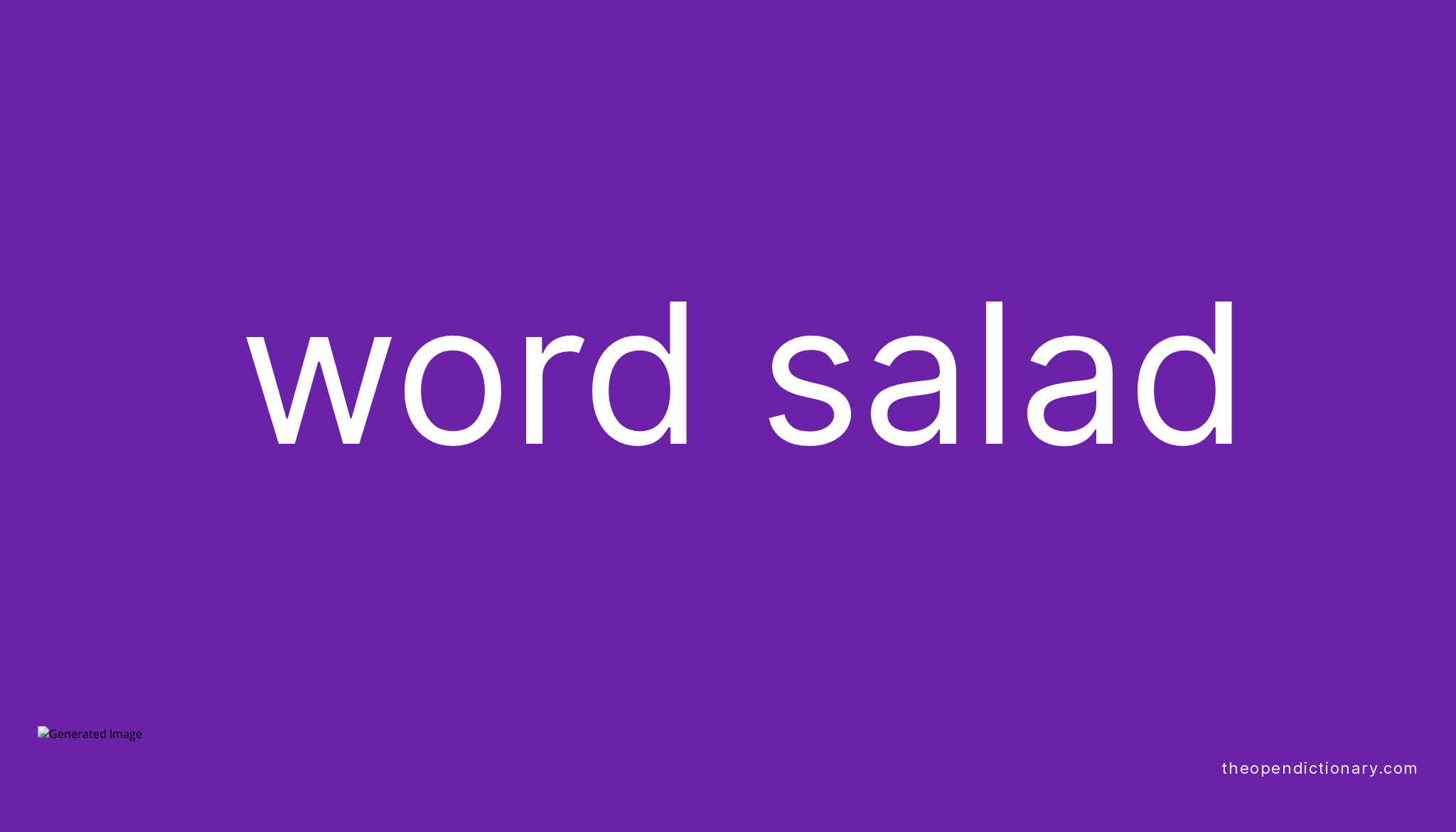Word salad 148 has become a fascinating topic in recent years, capturing the attention of both linguists and mental health experts. If you’ve ever heard someone speak in a way that seems like random words strung together, you’re probably witnessing what experts call a word salad. But what exactly is it? Why does it happen? And how can we make sense of this seemingly nonsensical phenomenon? Let’s break it down together, shall we?
Imagine this: you're having a conversation with someone, and suddenly they start spewing out phrases that don’t seem to connect. It’s like they’ve dipped their brain into a blender and hit the "puree" button. This is word salad 148 in action. It’s not just random gibberish; it’s a complex symptom that often points to deeper issues in the brain.
As we dive deeper into this topic, you’ll learn how word salad 148 is more than just a quirky linguistic quirk. It’s a window into the human mind, revealing how our brains process language, emotions, and logic. Whether you're a psychology enthusiast or simply curious about the human condition, this article will give you the insights you need to understand this intriguing phenomenon.
- Top Places Similar To Autozone For Your Automotive Needs
- Being A Mom Is Not Easy Quotes That Capture The Heart Of Motherhood
Here's a quick roadmap of what we'll cover:
- What is Word Salad 148?
- Common Causes of Word Salad
- Psychological Impacts
- Diagnosis and Assessment
- Treatment Options
- Prevention Tips
- Real-Life Examples
- Expert Perspectives
- Frequently Asked Questions
- Conclusion
What is Word Salad 148?
Word salad 148 is essentially a jumble of words and phrases that don’t make logical sense when strung together. It’s like trying to follow a recipe where the ingredients are all over the place, and the instructions are missing. This phenomenon is often seen in people with certain neurological or psychiatric conditions, such as schizophrenia or traumatic brain injuries.
For instance, someone experiencing word salad might say something like, "The clock is green and the sky is running through the window." While each word is technically correct, the overall sentence doesn’t follow any coherent structure or meaning. It’s like a puzzle with pieces that don’t fit together.
- Tom Cruise Before Veneers Unveiling The Smile Transformation
- Hot Nhl Players The Rising Stars Shaping The Future Of Hockey
How Does Word Salad Happen?
Word salad typically occurs when there’s a disconnect between the brain’s language centers. Think of it as a traffic jam in your brain's communication network. The left hemisphere, which is responsible for language processing, might be sending signals that the right hemisphere isn’t receiving properly. This miscommunication leads to the jumbled output we recognize as word salad.
Let’s break it down further:
- Neurological Factors: Damage to specific areas of the brain, such as Wernicke’s area, can impair language comprehension and production.
- Psychological Factors: Conditions like schizophrenia can disrupt the brain’s ability to filter and organize thoughts.
- Environmental Factors: Stress, fatigue, or substance use can exacerbate word salad tendencies in vulnerable individuals.
Common Causes of Word Salad
While word salad 148 can occur in various contexts, there are some common causes that stand out. Let’s take a closer look at the main culprits:
1. Schizophrenia
Schizophrenia is one of the most well-known conditions associated with word salad. People with schizophrenia often experience thought disorders that make it difficult to communicate clearly. Their brains struggle to organize thoughts into logical sequences, leading to the disjointed speech patterns we call word salad.
2. Brain Injuries
Traumatic brain injuries (TBIs) can also cause word salad, especially if the injury affects the language centers of the brain. Depending on the severity and location of the injury, the impact on language can vary from mild to severe.
3. Stroke
A stroke can disrupt blood flow to critical areas of the brain, including those responsible for language. This can result in aphasia, a condition where individuals struggle to produce or understand language. Word salad is a common symptom of aphasia.
Psychological Impacts
Word salad 148 isn’t just a linguistic issue; it has profound psychological implications. For the person experiencing it, word salad can be frustrating and isolating. Imagine trying to express yourself, only to find that your words come out all wrong. It’s like being trapped in a maze with no exit signs.
On the flip side, those interacting with someone exhibiting word salad may feel confused or even overwhelmed. Misunderstandings can lead to strained relationships, making it crucial to approach the situation with empathy and patience.
Diagnosis and Assessment
Diagnosing word salad 148 involves a thorough evaluation of the individual’s cognitive and linguistic abilities. Professionals typically use a combination of tools, including:
- Cognitive Tests: Assessing memory, attention, and problem-solving skills.
- Language Assessments: Evaluating the ability to produce and understand language.
- Neuroimaging: Using MRI or CT scans to identify structural abnormalities in the brain.
It’s important to note that diagnosis should always be done by a qualified healthcare professional. Self-diagnosis can lead to misinformation and unnecessary anxiety.
Treatment Options
Treating word salad 148 requires a personalized approach, as the underlying cause can vary from person to person. Some common treatment strategies include:
1. Speech Therapy
Speech therapists can help individuals improve their communication skills by teaching them strategies to organize their thoughts and articulate them more clearly.
2. Medication
In cases where word salad is linked to psychiatric conditions like schizophrenia, medication may be prescribed to manage symptoms and improve cognitive function.
3. Cognitive Behavioral Therapy (CBT)
CBT can help individuals develop coping mechanisms to deal with the emotional and psychological impact of word salad.
Prevention Tips
While some causes of word salad 148, like brain injuries, may be unavoidable, there are steps you can take to reduce your risk:
- Stay mentally active by engaging in activities like reading, puzzles, and learning new skills.
- Practice mindfulness and stress-reduction techniques to maintain mental clarity.
- Avoid substance abuse, which can impair cognitive function over time.
Real-Life Examples
To better understand word salad 148, let’s look at a couple of real-life examples:
Example 1: John’s Journey
John, a 45-year-old man, began experiencing word salad after suffering a stroke. Initially, his family was confused by his sudden inability to communicate effectively. However, after undergoing speech therapy and cognitive rehabilitation, John made significant progress in regaining his language skills.
Example 2: Sarah’s Story
Sarah, diagnosed with schizophrenia, struggled with word salad throughout her teenage years. With the help of medication and therapy, she learned to manage her symptoms and lead a fulfilling life.
Expert Perspectives
According to Dr. Emily Thompson, a renowned neuropsychologist, "Word salad 148 is a fascinating yet challenging phenomenon. It highlights the complexity of the human brain and the importance of early intervention in managing related conditions."
Dr. Thompson emphasizes the need for a multidisciplinary approach, combining medical, psychological, and social interventions to support individuals affected by word salad.
Frequently Asked Questions
1. Is Word Salad Always a Sign of Mental Illness?
No, word salad can occur due to various reasons, including brain injuries or strokes. However, it’s often associated with psychiatric conditions like schizophrenia.
2. Can Word Salad Be Treated?
Yes, with the right combination of therapies and interventions, many individuals can improve their communication skills and manage word salad effectively.
3. How Can I Support Someone with Word Salad?
Be patient, listen actively, and encourage them to seek professional help if needed. Small gestures of support can make a big difference.
Conclusion
Word salad 148 is a complex and intriguing phenomenon that sheds light on the intricacies of the human mind. By understanding its causes, impacts, and treatment options, we can better support those affected by it. So, the next time you encounter someone speaking in a jumble of words, remember that there’s often more to the story than meets the ear.
Feel free to share your thoughts in the comments below or explore other articles on our site for more insights into the fascinating world of language and cognition. Together, let’s unravel the mysteries of the mind!



Detail Author:
- Name : Fleta Shanahan MD
- Username : chammes
- Email : regan97@yahoo.com
- Birthdate : 1970-10-15
- Address : 8119 Keith Gardens New Kory, MI 03354
- Phone : +17166362848
- Company : Leffler, Jacobs and Fahey
- Job : Engraver
- Bio : Ipsum quaerat dolorem ipsam. Ut explicabo totam in repellendus et animi consequuntur. Autem esse incidunt dicta quia veritatis iste perferendis.
Socials
tiktok:
- url : https://tiktok.com/@van_hintz
- username : van_hintz
- bio : Tempore consequatur architecto deleniti quis minus.
- followers : 648
- following : 541
twitter:
- url : https://twitter.com/hintzv
- username : hintzv
- bio : Sed labore nihil aut qui ea amet. Harum fuga delectus voluptatem omnis. Doloremque nisi dolorem aperiam fugit magni voluptatem odio.
- followers : 4096
- following : 2235
linkedin:
- url : https://linkedin.com/in/van_xx
- username : van_xx
- bio : Quas optio facere esse.
- followers : 4838
- following : 83
instagram:
- url : https://instagram.com/van_hintz
- username : van_hintz
- bio : Suscipit consequatur ea reiciendis non voluptate. Atque labore consequatur nulla saepe quisquam.
- followers : 5812
- following : 609
facebook:
- url : https://facebook.com/vhintz
- username : vhintz
- bio : Libero delectus mollitia non nam repellat.
- followers : 6829
- following : 2509